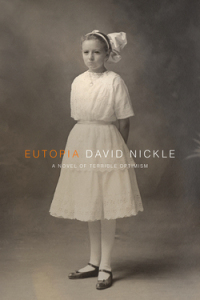Eutopia: A Novel of Terrible Optimism by David Nickle
 Saturday, May 14, 2011 at 5:57PM
Saturday, May 14, 2011 at 5:57PM
Published by ChiZine Publications on April 15, 2011
The setup creates the perfect atmosphere for a horror novel. Set in the fictional town of Eliada, Idaho, Eutopia begins in 1911 with the attempted hanging of Juke, a person (or perhaps a thing) with intensely black eyes. Juke survives the noose and Eliada's private police arrive in time to save Dr. Andrew Waggoner, the only black physician at Eliada Hospital, from the second half of the intended double lynching. The hangmen are wearing KKK garb and at least one is the brother of Maryanne Leonard, a seemingly deranged patient who died while Waggoner was trying to save her from injuries that apparently resulted from a botched outhouse abortion.
Joining the population of Eliada are Jason Thistledown, the only survivor of a mysterious epidemic that wiped out the town of Cracked Wheel, and Germaine Frost, a gatherer of information for the Eugenics Records Office. Jason and Waggoner soon discover that Maryanne isn't the only woman who suffered a grizzly death in the vicinity of Eliada. The other victims had similar injuries, but not all of them were pregnant.
Eliada's founder is Garrison Harper. His intent was to create a "stern Paradise," a "community devoid of strife and class warfare where men happily lifted their tools at sunrise and set them down again at sunset, not once tempted by Bolshevism or bad morals" -- in short, a 1911 version of Utopia. All the residents share common traits: the men are tall and strong, the women are "lean and comely," and none seem to suffer from a physical or mental infirmity. In contrast to Eliada's residents, many of those who live in the nearby woods are far from prime specimens of humanity. Neither is Juke, who lives in the hospital's quarantine building. Juke is a project of Dr. Bergstrom, who claims Juke is "beset by idiocy and infirmity. And certain -- irregularities in his anatomy." And then there are the mysterious Feegers, who seem to linger in the woods while worshipping ... something.
David Nickle's weaving of two real world horrors -- eugenics and racism -- into the novel's twin mysteries (the deaths near Eliada and the epidemic in Cracked Wheel) is ingenious. Nickle's writing style is at least a step above the ordinary. His prose is efficient; Nickle uses a few carefully selected words to set scenes that some writers would have wasted pages developing, a skill that allows the story to develop at a brisk pace. The mood and atmosphere are perfect for a tale of the supernatural. Nickle's writing, and particularly the sense of characters rooted to a particular place and time, reminded me of Joe Lansdale.
Much of the time, Eutopia has the feel of a conspiracy thriller: characters don't immediately realize they are in danger, and when they do, they don't understand why; puzzling out the "why" is the key to their survival. The nature of the threat is revealed about halfway through the novel, and (unfortunately) the story loses some of its zest at that point. The explanation (and the abilities manifested by Juke and his ilk) struck me as a little too silly to be truly chilling. In fact, the book might have been better without the supernatural element, although it probably wouldn't qualify as a horror novel at that point. Still, my dissatisfaction with the Juke/Feeger aspect of the plot didn't stop me from following the story to its surprising (and satisfying) conclusion. Nickle's strong writing and the carefully fashioned characters are reason enough to read and enjoy this novel.
RECOMMENDED